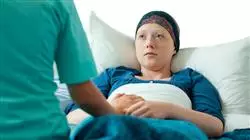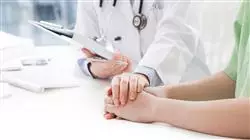University certificate
The world's largest faculty of medicine”
Introduction to the Program
Experiences of distress in the cancer process can have negative effects on the patient's health"

Currently, multiple lines of research and increasingly advanced therapies have been developed, focusing on the management and symptomatic control of cancer. This implies that patients experience short-, medium- and long-term effects of the disease. For this reason, a sub-specialty called "Psycho-Oncology" is beginning to emerge, which advocates for the psychosocial well-being of the oncology patient, the effects it has on their life and the impact on their family environment.
With the Masters Degree in this area, physicians will be able to expertly specialize in the comprehensive care of their oncology patients in all phases of the disease, i.e., from diagnosis to cases requiring special care to ensure comfort in the last moments. This also includes the mental health of the patient's family members and caregivers during the progression of the disease.
In this degree program, special emphasis will be placed on the need to improve students' communication skills and abilities, which will ensure that they are able to manage their emotions in any stressful or conflictive situation. This will be essential for the patient to adequately understand the process they are about to face. Likewise, special attention will be paid to the students' need to effectively manage Burnout symptoms, encouraging personal self-care.
In this way, the student will learn about the advances and contributions of psychology to oncology, which will help them to determine, with the patient and their family, realistic therapeutic objectives. Likewise, they will learn the intervention techniques designed to emotionally accompany the patient, identifying the symptoms and psychological alterations that represent a threat to the effectiveness of the treatment.
For all these reasons, doctors who take this Masters Degree will be able to become complete professionals. Therefore, they will be able to approach the disease from a novel approach that takes into account the emotional and social reality of the patient. Therefore, they can work in any hospital, nationally and internationally, under very stressful situations and a high emotional load.
Help your patients understand and accept the unfavorable prognosis using techniques designed by psycho-oncologists"
This Masters Degree in Psycho-Oncology contains the most complete and up-to-date educational program on the market. The most important features are:
- Practical cases presented by experts in Psycho-Oncology and medicine
- The graphic, schematic, and eminently practical contents with which they are created, provide scientific and practical information on the disciplines that are essential for professional practice
- Practical exercises where the self-assessment process can be carried out to improve learning
- Special emphasis is placed on innovative methodologies in Applied Psycho-Oncology in medicine
- Theoretical lessons, questions to the expert, debate forums on controversial topics, and individual reflection assignments
- Content that is accessible from any fixed or portable device with an Internet connection
As a physician, you must take care of yourself to avoid job stress when working in the oncology department of a hospital"
The program’s teaching staff includes professionals from the sector who contribute their work experience to this training program, as well as renowned specialists from leading societies and prestigious universities.
The multimedia content, developed with the latest educational technology, will provide the professional with situated and contextual learning, i.e., a simulated environment that will provide immersive training programmed to train in real situations.
This program is designed around Problem Based Learning, whereby the professional must try to solve the different professional practice situations that arise during the academic year. For this purpose, the student will be assisted by an innovative interactive video system created by renowned and experienced experts.
It reduces the concern of an oncology patient by understanding their family and social situation"

Improve your skills to communicate with patients in an assertive and reassuring manner"
Why study at TECH?
TECH is the world’s largest online university. With an impressive catalog of more than 14,000 university programs available in 11 languages, it is positioned as a leader in employability, with a 99% job placement rate. In addition, it relies on an enormous faculty of more than 6,000 professors of the highest international renown.

Study at the world's largest online university and guarantee your professional success. The future starts at TECH”
The world’s best online university according to FORBES
The prestigious Forbes magazine, specialized in business and finance, has highlighted TECH as “the world's best online university” This is what they have recently stated in an article in their digital edition in which they echo the success story of this institution, “thanks to the academic offer it provides, the selection of its teaching staff, and an innovative learning method aimed at educating the professionals of the future”
A revolutionary study method, a cutting-edge faculty and a practical focus: the key to TECH's success.
The most complete study plans on the university scene
TECH offers the most complete study plans on the university scene, with syllabuses that cover fundamental concepts and, at the same time, the main scientific advances in their specific scientific areas. In addition, these programs are continuously being updated to guarantee students the academic vanguard and the most in-demand professional skills. In this way, the university's qualifications provide its graduates with a significant advantage to propel their careers to success.
TECH offers the most comprehensive and intensive study plans on the current university scene.
A world-class teaching staff
TECH's teaching staff is made up of more than 6,000 professors with the highest international recognition. Professors, researchers and top executives of multinational companies, including Isaiah Covington, performance coach of the Boston Celtics; Magda Romanska, principal investigator at Harvard MetaLAB; Ignacio Wistumba, chairman of the department of translational molecular pathology at MD Anderson Cancer Center; and D.W. Pine, creative director of TIME magazine, among others.
Internationally renowned experts, specialized in different branches of Health, Technology, Communication and Business, form part of the TECH faculty.
A unique learning method
TECH is the first university to use Relearning in all its programs. It is the best online learning methodology, accredited with international teaching quality certifications, provided by prestigious educational agencies. In addition, this disruptive educational model is complemented with the “Case Method”, thereby setting up a unique online teaching strategy. Innovative teaching resources are also implemented, including detailed videos, infographics and interactive summaries.
TECH combines Relearning and the Case Method in all its university programs to guarantee excellent theoretical and practical learning, studying whenever and wherever you want.
The world's largest online university
TECH is the world’s largest online university. We are the largest educational institution, with the best and widest online educational catalog, one hundred percent online and covering the vast majority of areas of knowledge. We offer a large selection of our own degrees and accredited online undergraduate and postgraduate degrees. In total, more than 14,000 university degrees, in eleven different languages, make us the largest educational largest in the world.
TECH has the world's most extensive catalog of academic and official programs, available in more than 11 languages.
Google Premier Partner
The American technology giant has awarded TECH the Google Google Premier Partner badge. This award, which is only available to 3% of the world's companies, highlights the efficient, flexible and tailored experience that this university provides to students. The recognition as a Google Premier Partner not only accredits the maximum rigor, performance and investment in TECH's digital infrastructures, but also places this university as one of the world's leading technology companies.
Google has positioned TECH in the top 3% of the world's most important technology companies by awarding it its Google Premier Partner badge.
The official online university of the NBA
TECH is the official online university of the NBA. Thanks to our agreement with the biggest league in basketball, we offer our students exclusive university programs, as well as a wide variety of educational resources focused on the business of the league and other areas of the sports industry. Each program is made up of a uniquely designed syllabus and features exceptional guest hosts: professionals with a distinguished sports background who will offer their expertise on the most relevant topics.
TECH has been selected by the NBA, the world's top basketball league, as its official online university.
The top-rated university by its students
Students have positioned TECH as the world's top-rated university on the main review websites, with a highest rating of 4.9 out of 5, obtained from more than 1,000 reviews. These results consolidate TECH as the benchmark university institution at an international level, reflecting the excellence and positive impact of its educational model.” reflecting the excellence and positive impact of its educational model.”
TECH is the world’s top-rated university by its students.
Leaders in employability
TECH has managed to become the leading university in employability. 99% of its students obtain jobs in the academic field they have studied, within one year of completing any of the university's programs. A similar number achieve immediate career enhancement. All this thanks to a study methodology that bases its effectiveness on the acquisition of practical skills, which are absolutely necessary for professional development.
99% of TECH graduates find a job within a year of completing their studies.
Master's Degree in Psycho-Oncology
.
To comprehensively address cancer requires medical competencies that, beyond taking care of the diagnosis-treatment process, focus on the psychic state of the patient. Taking into account the important dimension of this work, at TECH Global University we have created this program specialized in the study of their respective emotions and their management in the face to face with the disease. Specifically, the curriculum addresses, at first, the characterization and areas of application of this subspecialty, the most notable psychological aspects according to tumor locations and coping styles according to personality. Regarding the area of action, it delves into the third generation therapeutic treatments, the emotional intervention protocols for the different pathological stages, the clinical evaluation processes and the ethical aspects of these practices in relation to palliative care. In addition, content is presented on the forms of communication with the patient and on the management of grief. Thanks to this theoretical-practical course, which also covers research in this area, students will be able to fully immerse themselves in the strategies of psychological preparation and carry out procedures to improve the quality of life of the affected population.
Specialize with our Master's Degree in Psycho-oncology
.
This TECH postgraduate course is an opportunity to strengthen skills in the correct identification, management and appeasement of emotions and feelings of people facing the state in which they are. With the knowledge acquired throughout the 12 months, professionals will be able to facilitate adaptation to the disease and promote appropriate coping styles, activating action frameworks where the ways to re-orient harmful and counterproductive behaviors, family-patient relationship tactics and available ways to create therapeutic links that allow tuning in with the patient's pain. Likewise, they will be able to develop psychological preparation programs that contribute to the continuation of the prescribed treatments, respecting, of course, bioethical principles. All this will be done by mobilizing a series of self-care tools that will protect the patient from burnout. In this way, then, the Master's Degree graduate will have what is necessary to provide quality medical care, through a daily clinical practice aimed at ensuring mental well-being in the last stages of life.







